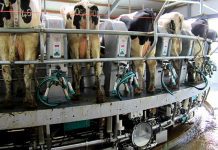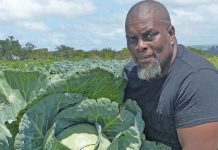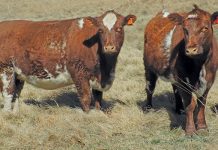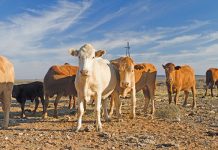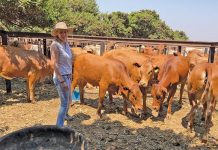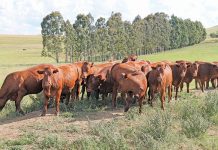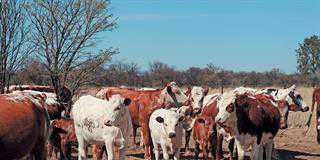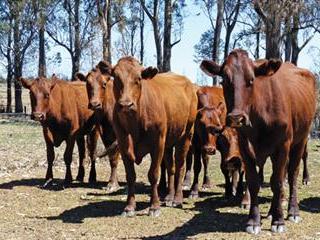
"A farm is not a place for a picnic. I started this farm with nothing – it wasn’t easy!’’ Moses Zengetwa is talking about Grootfontein (410ha), which he farms with another 420ha hired from a neighbour. And he is speaking from the heart. When he decided to go farming full-time 10 years ago, his life became a round of hard work and sleepless nights in order to service the loans needed to commercialise his livestock operation.
“It’s a farm today, but I didn’t sleep,” he chuckles. Grootfontein, however, is more than just another farm. It is good enough to have won Moses the coveted title of Agricultural Research Council (ARC) National Emerging Beef Farmer for 2013.
A long road
Born in 1948, Moses grew up in Cala, a village near Elliot in the Eastern Cape. His family kept a few cattle, which sparked his growing interest in commercial cattle farming. But attempting to establish oneself as a black commercial farmer in the 1970s and 1980s was tough. The area – part of the then Transkei homeland – was largely defined by communal land tenure.
It was impossible even to have breeding seasons, never mind keep rogue bulls from one’s cows. As a result, Moses moved to Cape Town in the mid-1970s to make a living. Here he worked as a driver before starting a taxi service between Cape Town and the Eastern Cape. His plan was to save money and establish small trading stores in rural Transkei. Within a short time he had set up seven stores with a manager or family member in charge of each.
In 1977 he returned home to oversee the running of the stores, which were doing well, as most of the white traders had left the Transkei prior to ‘independence’ in 1976. It was one of these traders who taught Moses a valuable life lesson. The man’s city slicker son had complained that his father was ‘penny pinching’.

Moses Zengetwa
“My son, you’re a doctor now,” said the man, “but (you’ve become one) from these cents. I sent you to school with these cents.” The father’s response shaped the way Moses viewed money from then on. “He was telling the truth. Those cents will make you a millionaire.”
A dream come true
Moses was determined to apply this lesson to his business ventures, and began investigating whether he could lease a farm from the Transkei government. Despite achieving success with his trading stores, he had never forgotten his dream of commercial farming.
Eventually, in 1988, he was able to lease Grootfontein. “When this happened, I just closed all my shops and came here,” he recalls. “I’d got what I wanted. Now was the time to focus on farming.” He began with cattle and sheep.
Bonsmaras
In the mid-1990s, Moses decided to look at a commercial beef breed to add value to his 10 crossbred cows. “A herd of cattle without quality bulls is nothing,” he says. He began by doing some serious research and asking the advice of his cousin, Enos Mbanga, an agricultural extension officer. He then bought 10 Bonsmara heifers and a bull from a commercial farmer in the neighbouring district of Indwe.
That was in 1995. Since then Moses has purchased Bonsmara bulls exclusively. He sources them mostly from commercial and stud breeders in the area, although in 2009 he also bought several bulls through the now-defunct Sakhisizwe Livestock Beef Project.
Producing quality
All cattle on Grootfontein receive a phosphate lick in summer and a protein lick in winter. The bulls are put to the cows in November and December at a ratio of one bull to 30 cows, while 15 to 20 replacement heifers are added to he herd annually. Moses saw one of his best calving rates ever in 2012: only two animals out of 110 breeding females failed to produce calves.
Average weaner weights off the veld of between 240kg and 250kg at about nine months ensure a good turnover. In recent years, however, Moses has sold only his best weaners from the veld, while smaller weaners are fed for between 60 to 90 days with feed before being marketed to feedlots.
“If you feed Bonsmara weaners, they’ll do something for you. But crossbred cattle from communal areas will take a long time to grow,” he says. Therefore, despite the rising price of diesel and fertiliser, Moses continues to grow as much feed as possible so that he can afford to add value to the animals before marketing. He currently plants 120ha maize and 50ha oats and is considering establishing 20ha of lucerne on Grootfontein.
Handling extreme conditions
Like many farmers, Moses was seriously affected by this year’s drought. Then, in early October, he suffered another setback when a fire swept through his farm. “All my land is burnt – everything,” he says. The veld fire was started by a burning car on the road alongside the farm. Moses was able to remove all his livestock in time, but the blaze burnt the maize in two silos, a loss that was keenly felt. Fortunately, he had other maize in storage.
He stresses that his maize and maize stover have enabled him to maintain relative stability in his livestock operations this year. Another problem that Moses has had to face is trying to source land via the Department of Rural Development and Land Reform. So far, his attempts have been unsuccessful, even though he has proved himself as a farmer.
The area around Elliot has exceeded its land reform targets, but Moses says it is frustrating to see unproductive farms mismanaged. “These projects are funded this year and next year they’re gone, because those people are just interested in money,” he says. “Let’s speak the truth, we do have challenges (in terms of land reform).” He cannot afford to buy land himself due to increasing prices.
Land reform, he adds, should be driven by farmers who show dedication and should not be just about transferring land. “The problem is the department wants to involve everybody, which is not going to happen,” he says. “You have to see if somebody wants to farm or just wants the money.”
Phone Moses Zengetwa on 072 205 3072.

